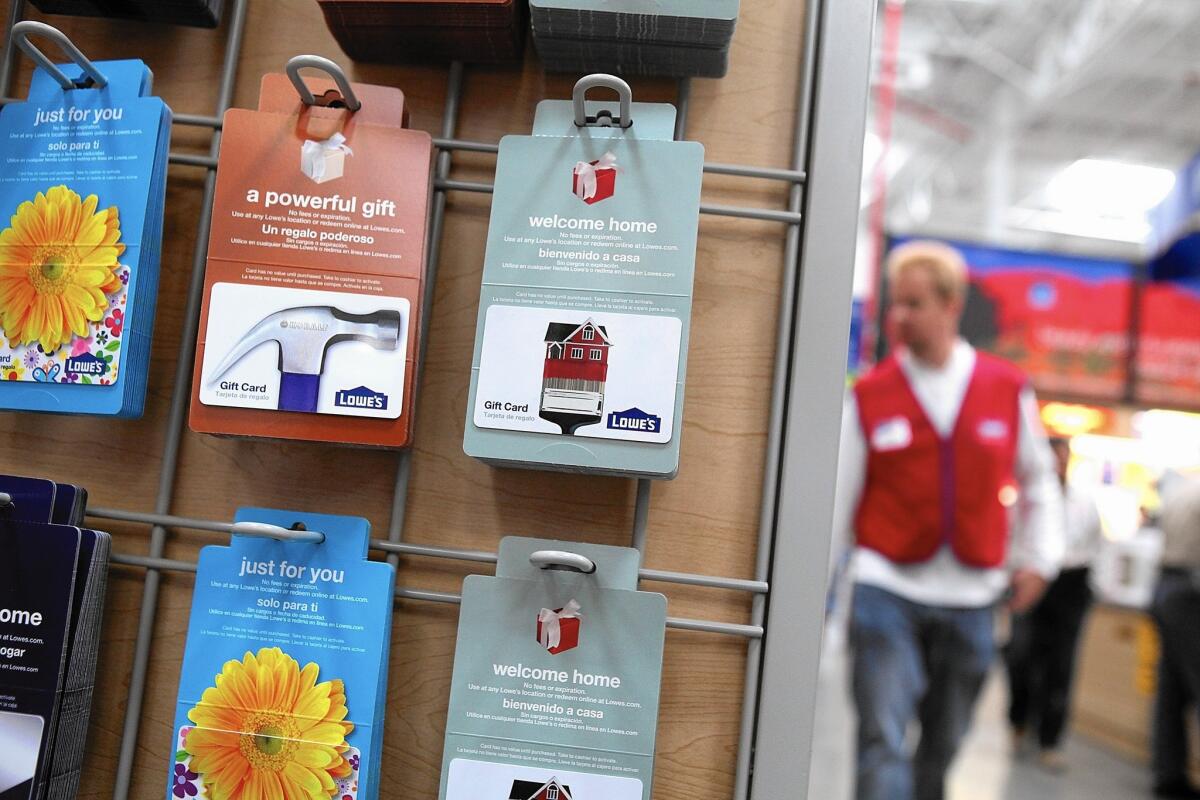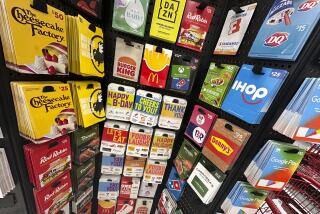Have gift cards become the modern day sweater? An expert weighs in

Gift cards for Lowe’s are displayed on a rack at one of the retailer’s stores in San Francisco.
As last-minute shoppers scramble to find Christmas presents, many will choose a reliable standby: the gift card.
Nearly three out of four Americans are expected to buy the cards this holiday season, with overall gift-card sales totaling $26 billion, according to the National Retail Federation.
The trade group also forecast that consumers will spend an average $153.08 on the cards this season.
Join the conversation on Facebook >>
But there are signs that Americans might be hitting a saturation point. This year’s average gift-card spending is expected to drop 11% from the average $172.74 spent last year, the first annual decline since 2009 when the severe recession hit, the group said.
Audrey Guskey tracks the gift-card industry as an associate professor of marketing at Duquesne University in Pittsburgh and we asked her to walk us through the business. Here’s an excerpt:
What’s the brief history of the cards?
Gift cards basically started in 1994. Blockbuster was offering paper gift certificates and some customers were able to duplicate them as counterfeits, so Blockbuster created this plastic card that we all now know as a gift card. Shortly after that, Neiman Marcus followed with a card as well. In the next couple of years it just blossomed to what it is now.
Why are they so popular?
It makes logical sense. When they initially came out, people associated them with money, so giving a gift card was like giving cash. Then consumers were able to personalize and customize gift cards. You could pick one from a certain restaurant or department store or from a particular golf course if you had a golfer in the family, for example.
SIGN UP for the free California Inc. business newsletter >>
They also make it easier for the gift giver, right?
It takes a lot of the guesswork out of making purchases for someone. They’re especially helpful for procrastinators.
But gift-card sales are expected to fall this year. Has the business topped out?
We’re going to get to a point of saturation sometime but it’s too early to say when. We may have peaked this year. I don’t know. But nearly 60% of consumers said they would like to receive a gift card this year, and it’s been the most requested gift for nine years in a row, according to the NRF.
We’re spending about $800 on gifts this holiday season on average and about $160 of that, or 20%, is going to be on gift cards. That’s still a huge chunk of change for shoppers.
What might be causing gift-card sales to level out?
I know they’re only 21 years old and people still want them, but gift cards are getting old and they’re not as fun or as exciting for the receiver as they once were. Perhaps the gift-card industry needs to do more to energize the business. They’ve already customized the cards, and they’ve made the cards more mobile and virtual.
What do you mean, more mobile and virtual?
You don’t need to have an actual card to give someone. You can print a card from your computer or email a gift card to someone and they can print it from their computer. Or they can receive the funding electronically in other ways.
You believe in buying gift cards at a discount, right?
Consumers should never pay full price for a gift card. There are discount websites out there such as Monstergiftcard.com, Giftcardzen.com or Cardpool.com. Sometimes you can get 5% off or even 25% off. If you’re buying a $100 gift card and you’re only paying $75, that’s a pretty decent discount, yet the face value for the gift’s receiver is still $100.
What laws regulate gift cards?
Every state has different laws and regulations, but at the federal level there was a bill passed in 2009 that basically limits expiration dates on the cards for at least five years. However, there are exceptions depending on the type of card.
Some prepaid debit cards could have different expiration dates and an activation fee that might be two or three dollars. Also, some gift cards that retailers give out as a loyalty reward or a bonus for shopping there — as opposed to the general gift cards you purchase for their stores — might expire sooner or have fees. Read the fine print.
Finally, you want to make sure the gift card is not a gift for the retailer. Consumers are sloppy using gift cards. If you get one, make sure you use the full value at some point.
Twitter: @PeltzLATimes
ALSO
How cable and broadcast TV news fared in 2015
Nissan’s Titan XD carves out new niche in truck market
Toy unboxing phenomenon is creating new YouTube stars
More to Read
Inside the business of entertainment
The Wide Shot brings you news, analysis and insights on everything from streaming wars to production — and what it all means for the future.
You may occasionally receive promotional content from the Los Angeles Times.











